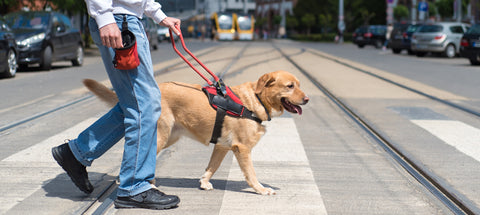Dogs can develop age-related illnesses just like us. Canine Cognitive Dysfunction – or CCD – shares a resemblance with the human form of Dementia, and it causes a decline in the dogs’ cognitive functions. In this post, we’re discussing the signs of Dementia in dogs, and breaking down the top tips for keeping your canine best friend as comfortable and calm as possible if you start to notice changes.

Signs of Canine Cognitive Dysfunction
The signs of CCD can be subtle and their onset gradual, so it’s a condition that can often go unnoticed for a while. Here are some things to look out for…
- Confusion. Is your dog looking lost or disoriented? Is he or she pacing back and forth or in circles? Or perhaps getting ‘stuck’ somewhere there’s a clear way out?
- Aggression. Dogs with CCD can have little patience, and can display signs of aggression.
- Depression. If your dog seems withdrawn, anxious or depressed this could be a sign that something’s wrong.
- Memory loss. Your canine may appear to have forgotten certain commands, where food and water bowls are kept, and may stop responding to his or her name.
- Sleeping more and eating less. Extra-long naps aren’t a cause for concern, but if your dog’s suddenly sleeping a lot more than usual, this could be a sign of CCD. The same goes for loss of appetite.

Treatment for CCD
Heartbreakingly, there’s no cure for CCD. But your vet will be able to prescribe certain medications that can improve your dog’s quality of life. You’ll also receive helpful advice on any adjustments you need to make at home – such as changes to diet or certain methods for behavior management. The important thing is to make sure your pooch is as comfortable and relaxed as possible. Here are some other things to bear in mind…
- Ensure your pet is still exercising regularly
- Avoid changing furniture around, as this can cause confusion
- Stick to a consistent routine when it comes to the likes of eating, walks and bedtime
- Make sure your dog’s getting lots of sun exposure to aid sleep
- Establish a calm home environment (naturally, with lots of cuddles)
- Introduce suitable toys that will stimulate the brain in the right way
Above all, show as much patience, love and understanding as possible. CCD is a complex and distressing condition, but there are ways to make things more bearable – for your canine and you. Take a look at dogdementia.com for more information and support.










